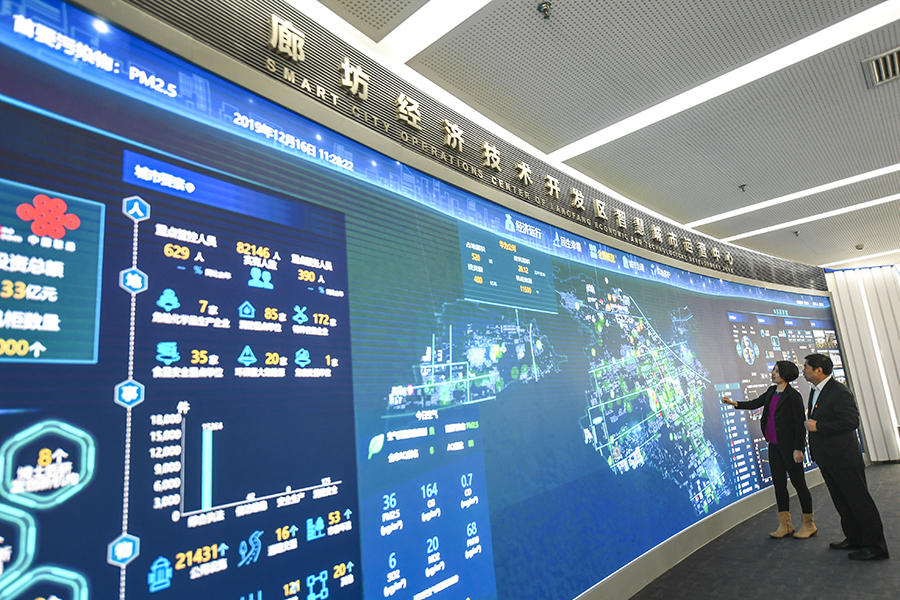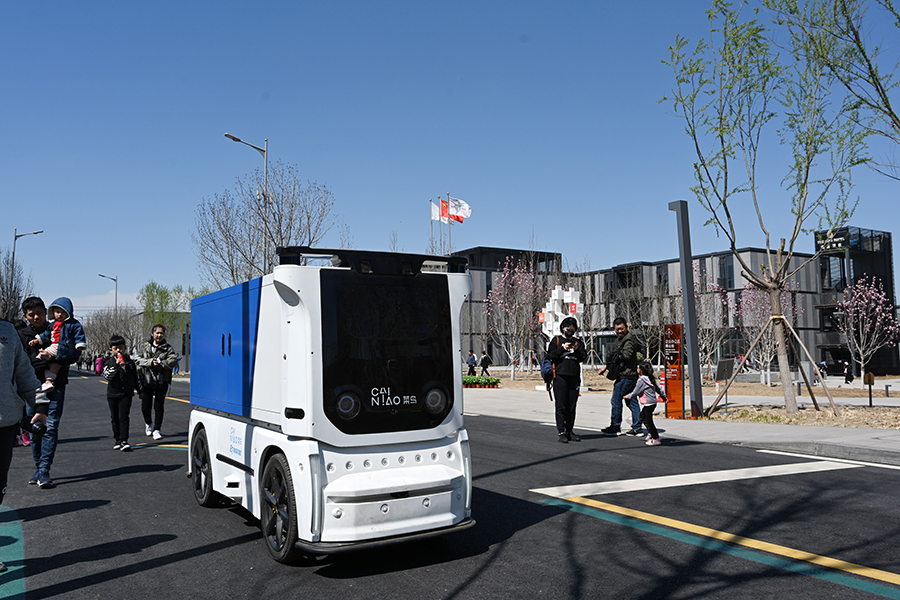
From the People's Daily App.
This is Story in the Story.
Imagine a world of cities where multistory buildings, cars, traffic lights, people and a zillion other things all communicate with each other. Such "smart cities" will acquire dimensions of reality in China sooner than you would imagine, field experts say.
Powered by the next-generation information technologies such as 5G, mobile internet, internet of things, artificial intelligence and cloud computing, China is gearing up to develop smart cities nationwide.
In China, improving cities, especially metropolises, is an urgent and pressing demand as the urban population is growing amid rapidly increasing urbanization, according to experts.
In 1949, just 10.6 percent of people, or 57 million residents, lived in 132 cities in China. But, by the end of 2018, nearly 60 percent of the country's population, or 830 million residents, lived in 672 cities.
The figures continue to grow.
Today’s Story in the Story looks at the growing potential in smart cities development and how tech companies are ramping up efforts to be part of the rapidly expanding sector.

Two technicians analyze data at the smart city operational center in Langfang city, Hebei province. (Photo: Xinhua)
"As the population grows and we become more urbanized rapidly, the carrying capacity of the cities cannot sustain the pressure of population explosion," said Shan Feng, deputy head of the Digital City Engineering Research Center, which is part of the Chinese Society for Urban Studies.
"Diseases could emerge as new problems in cities due to resource shortages, traffic congestion and pollution, raising new concerns for the government's public management capabilities."
A new report from market research firm MarketsandMarkets estimated the smart cities market in China is projected to reach $59.9 billion by 2023 from $30.4 billion in 2018.
According to the report, the growth is mainly driven by an increase in population, the need for rapid urbanization and the government's investment and policies to speed up the implementation and development of smart city projects.
MarketsandMarkets noted China is the biggest marketplace in the Asia-Pacific region in terms of development of smart cities, and the APAC region is set to emerge as the main revenue contributor to the smart cities market globally.
By 2023, the global market for smart cities is estimated to grow to $717.2 billion from $308 billion in 2018, the company said.
In fact, the adoption rate of smart cities solutions is growing rapidly in China. Not only some big cities but small and medium sized cities are actively embracing digital solutions.
For instance, Yingtan, a city in Central China's Jiangxi province, is accelerating the push for building an internet of things-enabled digital economy. By 2018, Yingtan's 1.1 million people had connected to the internet of things.

A Cainiao Network 's self-driving electric express car runs in Xiongan New Area in Baoding city, Hebei province. (Photo: Xinhua)
Yao Yao, head of property investment and management consultancy JLL's research in China, said smart cities' construction plays a more important role in China when compared to other markets.
"On the one hand, the practice of smart cities will help alleviate the increasing burden on traditional infrastructure systems caused by the rapid increase in urban population. On the other hand, intelligent application in fields including travel, safety, health and energy will improve the quality of all aspects of residents' life. And the key issue is how to meet people's growing need for a better life," Yao noted.
Beijing Percent Information Technology has seen huge potential in the market. So far, it has served more than 10,000 clients both at home and abroad, including a number of government customers.
"In the era of data intelligence, data has become a new and most important means of production, while data intelligence has become a key infrastructure in the cities," said Su Meng, chairman and CEO of Beijing Percent Information Technology.
According to Su, China has seen a growing number of digital cities and e-government projects on the ground.
"The digital cities market is really huge," Su noted. "The government is aware of the importance of data assets and the social benefits brought by the data sharing and exchanges. And now, we are at a very early development stage."
Shan said next-generation technologies such as the ultrafast 5G and smart cities will see rapid development, and new applications will pop up gradually.
"However, we are still facing some challenges in the development of smart cities," Shan said. "More efforts are needed to shift the focus to residents, innovation, integration of different sectors and refined management."
(Produced by Nancy Yan Xu, Brian Lowe, Lance Crayon and Paris Yelu Xu. Music by: bensound.com. Text from China Daily.)


